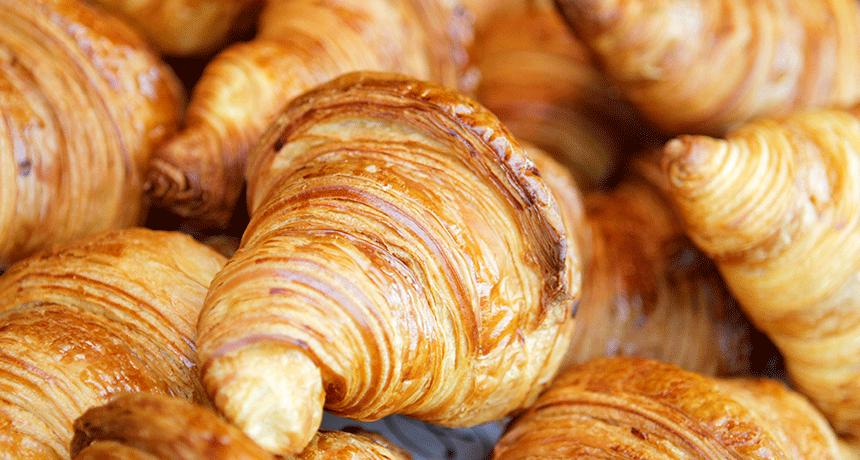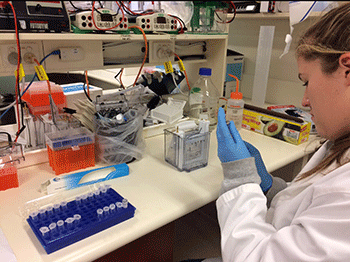Science-fair finding allows girl to sample a croissant
She tested if pills could break down proteins in bread that can make some people sick

Croissants used to be Cassandra’s favorite food. But they contain gluten, which can make her very sick.
Nilufer/istockphoto
PITTSBURGH, Pa. — For people with celiac disease, a restaurant menu can be a minefield. It’s something Cassandra Dods,18, has learned the hard way. She can’t eat many popular foods without becoming sick. Some companies sell pills online that they claim can help. But Cassandra wasn’t sure they would work. So she decided to test them. In the end, she was so confident in her results that she tried one of the pills herself.
Cassandra, who recently graduated from Tinturn Grammar School in Melbourne, Australia, has celiac disease. It’s a disorder in which the intestines cannot tolerate gluten — a pair of molecules that give baked goods their delicious chewiness. Eating gluten can leave celiac patients with dire stomach upsets and worse. Cassandra can’t consume bread, pasta, pizza and many other foods. She can’t even eat her past favorite food — croissants.
Of course, people who can’t eat gluten can ask for gluten-free foods. But gluten has a way of getting into foods where people might least expect it. “It happens quite a bit,” Cassandra explains. “The other day I had a milkshake. I thought it was normal. In fact, “there were pretzels in it!” Those pretzels? They contain gluten. “Why are there pretzels in a milkshake?” she asks. “It makes no sense.”
Cassandra isn’t alone. Around one percent of people worldwide have celiac disease. Anytime they accidentally eat gluten, they can end up with nausea, cramps and other painful problems. Some people buy food supplements that are supposed to help. The pills are sold over the internet and contain enzymes — molecules that can break down certain chemicals. Those enzymes are supposed to get to the gluten and destroy it before it sickens someone. But do they work?
Cassandra wasn’t really sure if she should trust their claims. She decided to test two different products. One contained an enzyme called caricain (KAIR-ih-kayn). It’s derived from a papaya plant. It can break down many different molecules — including gluten. The other contains a mix of enzymes — but the company doesn’t identify precisely which ones.

To find out if either product really broke down gluten, Cassandra went to the lab of Gregory Tanner. He’s a botanist — someone who studies plants — at the University of Melbourne.
In his lab, the teen ground up the two types of pills. She also prepared another enzyme called trypsin (TRIP-sin). Everyone has this enzyme, which can help digest a bit of gluten. She put the pills and the trypsin into liquids that were meant to mimic the stomach and small intestine. One liquid was very acidic, like the stomach. It had a pH of around 3. The other solution was more neutral, like the small intestine. It had a pH of around 7. Then she added gluten from barley.
After giving the enzymes time to work, Cassandra ran a test called an ELISA. This is a test that can detect very small quantities of chemicals. She also ran another test called a Western Blot. It can separate molecules by their size.
The pill with the enzyme from the papaya plant worked very well. By the time it was done, there was almost no gluten left. The papaya enzyme worked in both the acid and neutral environment. It even worked after being boiled.
The other pill broke down some gluten, but not all. And it didn’t stand up to being boiled. But both pills performed better than trypsin.
Cassandra presented her results here, this week, at the Intel International Science and Engineering Fair (ISEF). This annual science competition was created by Society for Science & the Public and is sponsored, this year, by Intel. The event brought together almost 1,800 finalists from 81 countries to present their science-fair projects to the public and to compete for almost $5 million in prizes. (SSP also publishes Science News for Students and this blog.)
But how pills work in a dish may not mimic how they could work in the body. Cassandra decided to try the more effective pill from her tests. “I had an obsession with croissants before I became gluten-free, so my parents tried to find me good gluten-free croissants. But they are shockingly bad,” she says. “I thought if I was going to test it, I was going to have a croissant.” That way, she explains, “I would be happy even if I have a reaction.” She popped the pill and ate the pastry.
It worked. “I didn’t react,” she says. “It was really good!”
Even though she tried it for a test, Cassandra is not giving up her gluten-free lifestyle. “We don’t know the long-term effects” of eating gluten with these supplements, she says. But the teen carries them with her to take when she’s not sure if her food is entirely gluten-free. If she ends up accidentally downing gluten, at least she has a backup plan.
Follow Eureka! Lab on Twitter







